中西方商务礼仪(英文)
中西方商务礼仪行为差异的研究基于高低语境理论
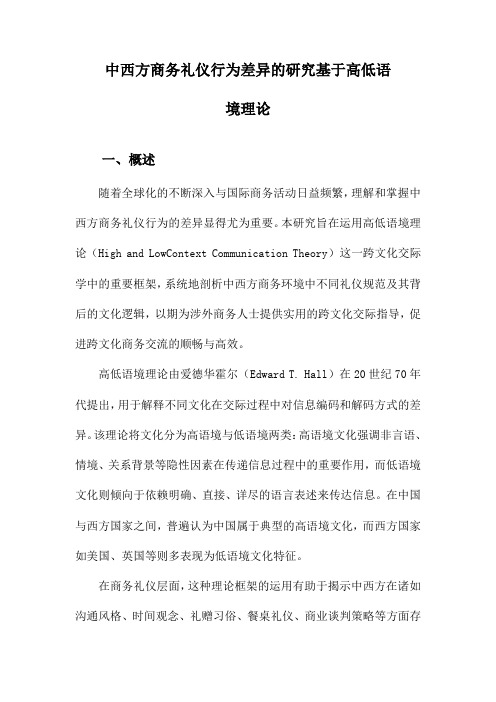
中西方商务礼仪行为差异的研究基于高低语境理论一、概述随着全球化的不断深入与国际商务活动日益频繁,理解和掌握中西方商务礼仪行为的差异显得尤为重要。
本研究旨在运用高低语境理论(High and LowContext Communication Theory)这一跨文化交际学中的重要框架,系统地剖析中西方商务环境中不同礼仪规范及其背后的文化逻辑,以期为涉外商务人士提供实用的跨文化交际指导,促进跨文化商务交流的顺畅与高效。
高低语境理论由爱德华霍尔(Edward T. Hall)在20世纪70年代提出,用于解释不同文化在交际过程中对信息编码和解码方式的差异。
该理论将文化分为高语境与低语境两类:高语境文化强调非言语、情境、关系背景等隐性因素在传递信息过程中的重要作用,而低语境文化则倾向于依赖明确、直接、详尽的语言表述来传达信息。
在中国与西方国家之间,普遍认为中国属于典型的高语境文化,而西方国家如美国、英国等则多表现为低语境文化特征。
在商务礼仪层面,这种理论框架的运用有助于揭示中西方在诸如沟通风格、时间观念、礼赠习俗、餐桌礼仪、商业谈判策略等方面存在的显著差异。
例如,中国商务交往中重视关系的建立与维护,倾向于通过含蓄表达、暗示及长期关系中的默契来理解对方意图,而西方商务环境更注重契约精神和明确的条款说明,强调直接、清晰的口头与书面沟通。
同样,对于时间管理,中国商务文化往往体现出更为灵活、注重人情的特性,而西方则严格遵守时间约定,视其为尊重他人与效率的体现。
本研究将首先概述高低语境理论的核心概念与分类依据,继而结合具体实例,深入探讨中西方商务礼仪行为在各个关键环节中的异同,以及这些差异如何受到各自文化语境特性的深刻影响。
研究不仅停留在现象描述层面,还将尝试挖掘造成这些差异的文化根源,如历史传统、社会结构、价值观等,并探讨在实际商务交往中如何恰当地应对和适应这些差异,以提升跨文化商务沟通的效果。
本研究以高低语境理论为切入点,通过对中西方商务礼仪行为差异的系统梳理与分析,旨在为跨国商务实践提供理论支撑与实践指导,助力全球商务参与者跨越文化鸿沟,实现更加和谐、有效的跨文化商务1. 研究背景与意义在全球化的今天,中西方商务交流与合作日益频繁,商务礼仪作为文化交流的重要组成部分,其差异性和共性逐渐受到学者和商界人士的广泛关注。
中国商务礼仪 英文 Business Etiquette in China

Business Relationship in China
• Chinese business relationship inevitably becomes a social relationship after a while. Unlike Western business relationship which remains professional and perhaps, aloof, even after a long time, Chinese business relationship becomes a social one. • The more you share your personal life, including family, hobbies, political views, aspirations, the closer you are in your business relationship. Sometimes, a lot of time is spent discussing matters outside of business, but then a lot of time, the other party is also making up his mind about your deal based on how much he sees your personal relationship with him.
Business Etiquette in China
5
Extension for Giving Face
• Do not underestimate the concept of losing face. Arriving late, causing embarrassment, behaving confrontationally, insisting too hard on paying a bill or calling attention to a mistake can all cause loss of face. • However, complimenting someone on their business acumen in front of their colleagues is an easy way to win points. • If a Chinese person has misunderstood you, or cannot (or does not want to) answer a question, they may laugh to cover their embarrassment. Try not to get agitated. They may come back to you with an answer later once they’ve had the chance to think it through or find out the answer. If they don't, you’ll need to ask again—but it's best not to do this in front of others so as not to cause a loss of face.
商务礼仪英文版

3) Placing a call on hold
I." May I place you on hold, please?” Wait for the reply II.Should the waiting time be longer, make a point of getting back to the caller on hold every 2 min to give the caller a “progress report. “Thank you for holding, ××. I am afraid that ×× is still on the other line. Would you like to keep holding or may I take a message?” III.Always thank the caller for holding and show him that we appreciate his time and patience. “Thank you for holding, this is ×× speaking, how may I assist you?”
Some phrase and sentence
One moment, please. Hold on, please. I am sorry, ***is not in the office now. Who is speaking ,please. May I have your name, please. Would you like to leave a message? Pardon, I did not get you . Would you say it again please? How to spell your name ,please? Thanks for your calling.
英国商务礼仪英文版ppt课件
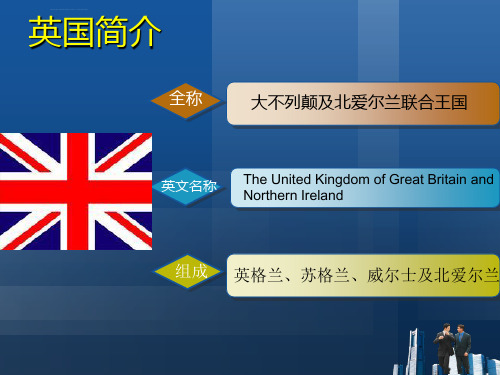
重要的第一句:smile 并问候nice to meet you.,, I’m clover from ~~~~ 第二句:确定接到正确的人后,问旅途如何 how was you flight 第三句:如果客人有行李,帮忙提does you have some luggage? 带他去住的地方 we booked a hotel for you ,you should have a rest.
感谢聆听
感谢聆听!
会见礼仪 Meeting etiquette
宴请礼仪 Dinner etiquette
电话礼仪 The telephone etiquette
1) The first impression."Hello,this is Tianjin import&export Corp." 2) Answer the phone as soon as possible. 3)Answer the phone with smile,because people can feel the smile when you're talking.
宴请礼仪(2) Dinner etiquette
Business attitude should be conservative and cautious in the UK, invited each other breakfast isn't popular in business. Generally speaking, their lunch is simple, to dinner more attention, as a meal. The British have the habit of drinking afternoon tea master often invite you to drink afternoon tea, in this case, be turned away.
西方商务礼仪介绍英文500词
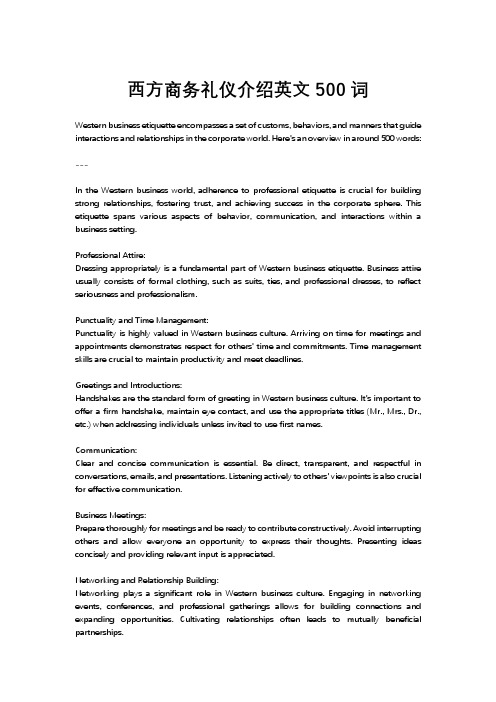
西方商务礼仪介绍英文500词Western business etiquette encompasses a set of customs, behaviors, and manners that guide interactions and relationships in the corporate world. Here's an overview in around 500 words:---In the Western business world, adherence to professional etiquette is crucial for building strong relationships, fostering trust, and achieving success in the corporate sphere. This etiquette spans various aspects of behavior, communication, and interactions within a business setting.Professional Attire:Dressing appropriately is a fundamental part of Western business etiquette. Business attire usually consists of formal clothing, such as suits, ties, and professional dresses, to reflect seriousness and professionalism.Punctuality and Time Management:Punctuality is highly valued in Western business culture. Arriving on time for meetings and appointments demonstrates respect for others' time and commitments. Time management skills are crucial to maintain productivity and meet deadlines.Greetings and Introductions:Handshakes are the standard form of greeting in Western business culture. It's important to offer a firm handshake, maintain eye contact, and use the appropriate titles (Mr., Mrs., Dr., etc.) when addressing individuals unless invited to use first names.Communication:Clear and concise communication is essential. Be direct, transparent, and respectful in conversations, emails, and presentations. Listening actively to others' viewpoints is also crucial for effective communication.Business Meetings:Prepare thoroughly for meetings and be ready to contribute constructively. Avoid interrupting others and allow everyone an opportunity to express their thoughts. Presenting ideas concisely and providing relevant input is appreciated.Networking and Relationship Building:Networking plays a significant role in Western business culture. Engaging in networking events, conferences, and professional gatherings allows for building connections and expanding opportunities. Cultivating relationships often leads to mutually beneficial partnerships.Business Cards:Exchanging business cards is common in Western business practices. Ensure your card includes accurate contact information and present it with both hands as a sign of respect.Dining Etiquette:Business dinners or lunches are common for professional engagements. Familiarity with dining etiquette is crucial, including table manners, polite conversation, and following the lead of the host regarding when to begin eating and discussing business matters.Follow-Up:After meetings or networking events, sending a follow-up email or note expressing gratitude for the opportunity to meet and discussing any future plans or actions demonstrates professionalism.Cultural Sensitivity:Respecting diversity and cultural differences is vital. Being aware of and sensitive to different cultural norms and practices contributes to successful cross-cultural communication and collaboration.In summary, mastering Western business etiquette is essential for building professional relationships, fostering credibility, and achieving success in the competitive business world. Adhering to these etiquette guidelines showcases professionalism, respect, and adaptability, which are highly valued in Western business cultures.。
商务礼仪 Business Etiquette 英文版 ppt
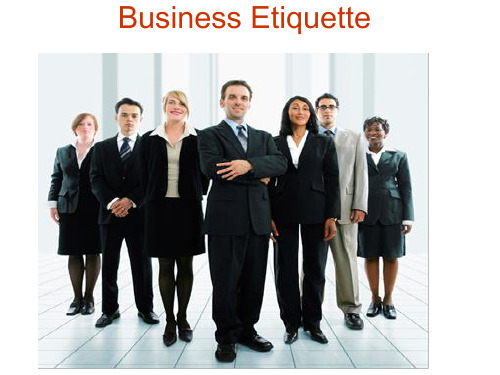
二、Table manner
• 1) China's table manner • Generally,seats that closer to the top table take precedence(优先).For example, on the wedding party,family members of the bride or the leaderships are arranged to the table that closest to the tap table.
批注本地保存成功开通会员云端永久保存去开通
Business Etiquette
一、Dress etiquette
• Dress is a culture, it can reflect a nature’s cultural level and the material civilization level of development .
• We know that diffeerent preferences, so their ways of dress vary.
• Even so, we still have some basic principles to follow according to people’s beautyappreciation standard
• 2) West’s table manner • Wash you hands before each meal. • Knife and spoon are placed to the right of the plate. The fork is on the left.
• Open the napkin and place it in your lap before starting.
中西方餐桌礼(商务英语礼仪课程)
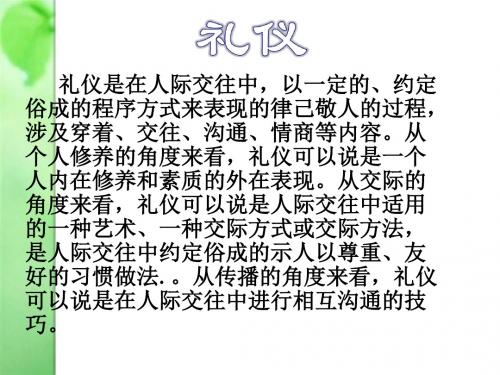
西方进餐礼仪
——刀叉篇
•切法
使用刀子切食物,先将刀子轻轻推向前, 再用力拉回并向下切,这样就不会发出刺耳 声音了。
西方进餐礼仪
——刀叉篇
•叉法
西方进餐礼仪
——刀叉篇
•吃到中途离席,刀叉该如何放?
应该把刀叉朝八字型放置, 刀口朝内、叉齿朝下。
西方进餐礼仪
——刀叉篇
•吃完后,刀叉该如何放?
左:应放在四点钟位置。 右:应将刀叉重迭,这样方便服务生
收时,不至于因为刀叉碰撞而发 出声响,或是刀叉掉落的意外。
麻烦你传一下 …
A quick glance at the table setting
中方餐具主要有杯 子、盘子、碗、碟 子、筷子、匙羹等 几种。
中方餐具
西方餐具
西方餐具主要包括刀、叉、 匙、盘、杯等。
刀又分为食用刀、鱼刀、 肉刀、奶油刀、水果刀; 叉又分为食用叉、鱼叉、 龙虾叉;公用刀叉的规格 一般大于使用刀叉。匙又 分汤匙、茶匙等;
吃到鱼头,鱼刺,骨头 等物时,不要往外面吐, 也不要往地上仍.要慢慢 用手拿到自己的碟子里, 或放在紧靠自己餐桌边 或放在事先准备好的纸 上
要适时地抽空和左右的人聊几句风 趣的话,以调和气氛.不要光着头吃饭, 不管别人,也不要狼吞虎咽地大吃一顿, 更不要贪杯.
最好不要在餐桌上剔牙.如果要剔 牙时,就要用餐巾或手挡住自己的嘴巴.
• 进餐时不要打嗝,也不要出现其他声音。如果出现打喷嚏、肠鸣 等不由自主的声响时,就要说一声“真不好意思”、“对不起”、 “请原凉”之类的话,以示歉意。
如果要给客人或长辈 布菜.最好用公筷.也可以 把离客人或长辈远的菜肴 送到他们跟前,按我们中华 民族的习惯.菜是一个一个 往上端的.如果同桌有领导, 老人,客人的话.每当上来 一个新菜时就请他们先动 筷子.或着轮流请他们先动 筷子.以表示对他们的重视.
商务英语 中国的商务礼仪 全英文

taken apart; the color of the skin socks (can not
be damaged) ; wear sandals and socks, wear
short skirts and socks; avoid dew, Short,
first, prevent too much. Second, prevent being too expensive for others to accept easily.
13
Third, prevent the volume from being too large for easy carrying.
10
through
1 Business dress
Business Personnel (ladies) wearing a professional dress note
3、attention can not wear casual shoes with professional dress, wear skirts rather than darning socks also do not wear short socks
4
1 Business dress
Different types of business situations:
Social occasion
Social Interactions have their own personality. First
of all, social occasions are divided into five: social
- 1、下载文档前请自行甄别文档内容的完整性,平台不提供额外的编辑、内容补充、找答案等附加服务。
- 2、"仅部分预览"的文档,不可在线预览部分如存在完整性等问题,可反馈申请退款(可完整预览的文档不适用该条件!)。
- 3、如文档侵犯您的权益,请联系客服反馈,我们会尽快为您处理(人工客服工作时间:9:00-18:30)。
Different Business Etiquette between China and theWestI. IntroductionBusiness etiquette is a kind of civilization accumulation of human being.It becomes fixed during the business communication, being handed down from generation to generation. It is also a kind of standard behavior observed by the businessmen in their communication. Different countries have different culture traditions, so their business etiquette is also different from one another. There are great cultural differences between the cultural cores of Confucian in China and the cores of Christian in the West, which leads to some differences in the business etiquette between China and West.II. The Influence of Cultural Differences on Business Etiquette Differences Between China and the WestGenerally speaking, the differences on business etiquette between China and the West are influenced by several cultural factors, such as values, view of time, view of space, view of diet, verbal habits and nonverbal. The paper mainly focuses on time and space approach.2.1 From the approach of timeThoreau once said,“If a man does not keep pace with his companions, perhaps it is because he hears a different drummer.”Now, we use the phrase “the beat of a different drummer”to explain any different pace of life. The attitudes toward time vary from culture to culture. And it is understandable that people of different cultures hold different views toward time. When it comes to international business, the view of time can be divided into two types, such as monochromic time and polychromic time. Countries that follow monochromic time perform only one major activity at a time, while countries obeying polychromic time perform several activities simultaneously. (Jeanette S. 113)The United States is a monochromic culture. In monochromic culture, time is regarded as something tangible. Time is seen as linear and manageable. Therefore, people concentrate on the task at hand, taking time commitments seriously and being accustomed to short-term relationships. For example, in the West, time is a kind ofprecious and limited resource. The business people attend the business meeting on time. If someone was late, he would be considered to be lack of honesty. And the U.S. business people always expect to solve their business problems within twenty to thirty minutes. In monochromic cultures, it is considered a rude to do two things at once, such as reading a journal in a meeting or answering the telephone while someone is in your office. Schedules and keeping appointments are consistent with value of people in monochromic cultures.Chinese people are typical example of polychromic cultures. Chinese people are well adapted to doing several things at once and do not mind interruptions. In their opinion, people are more important than schedules to members of polychromic cultures. Their lifestyle is less organized than that of monochromic people. In their eyes time is just like a circle that does not have the end. So Chinese people are highly distracted and subject to interruptions. They consider time to be casual and flexible. For example, to most Chinese today, time simply flows from one day to the next. If a job is not done today, maybe it will be done the next day or the next. And the business meeting would generally last for several hours.Compared with the Westerners, few Chinese equate time with money. When foreign businessmen arrive in China, most Chinese will make them settle down in hotels and give them an opportunity to rest up. Because Chinese do not expect them to immediately rush into business. However, generally this arrangement will be politely but firmly rejected by visitors. When Chinese are involved in international business, they will get familiar with the Western concept“time is money”. But they do not automatically relate it to the pace of business.Besides, Chinese do not pay much attention to the appointment. Sometimes even if there is an appointment, the Chinese would not stick to it seriously. When people of different cultures interact, misunderstandings often arise as a result of different time view. For instance, in the Western countries, the business contact would be pre-arranged within three to four weeks. Business people pre-arrange the business contact at least two weeks in America. The appointment is holy to Americans. In the business communication, if someone asks to have a business contact at the lastminute, he will be considered to make trouble or insult the others. On the contrary, the Chinese people pay more attention to relationship. In their business activity, if there is an important person need to be contacted, they could cancel the primary appointment to meet him. It is unacceptable to American business people. This example shows the cultural differences in time sense between China and the West. And it becomes increasingly important as modern business communications put more and more businessmen in daily contact. If we are to avoid misunderstanding, we need to know better about our own cultural biases and those of others. (Wen Yaoqing, 127) 2.2 From the approach of spaceSpace, is the physical distance between people when they are interacting. It is deeply influenced by culture. When people are having a conversation, the distance between them changes dramatically from one culture to another.Generally speaking, there are four zones when U.S. people interact: the intimate zone, the personal zone, the social zone, and the public zone. The intimate zone, less than 0.46 meters, is reserved for a close friend. And it appears briefly when the business colleagues shake hands. The personal zone, from 0.46 meters to 1.2 meters, is used for giving instructions to someone in an office. The social zone, from 1.2 to 3.6 meters, is used for impersonal and formal business meeting. The public distance, over 3.6 meters, is the most formal zone. (Lillian H. 83)Americans tend to need more spaces than Chinese. When having a conversation with Chinese, Americans will back away for the Chinese partner is standing too close. Standing too close to someone in the United States may leave a bad impression on the others, as it implies the person is upset, overbearing, or he is making sexual advances. These negative positions should be avoided in the United States. In China, people prefer to stand close to each other and they think it is a normal and friendly way to communicate with each other.Besides, the arrangement of desks, chairs, and conference table also feature the different styles of communication. When the United States people are conversing, they prefer the face-to-face arrangement of chairs whereas the Chinese prefer side-by-side arrangement. They like this arrangement because they could avoid directeye contact through it.IV. ConclusionWith the globalization of the world economy, organizations are culturally diverse in handling all kinds of business activities, especially multinational cooperation. More and more business people have become aware of the strong impact from culture. And they should have a good understanding of the other business etiquette culture beforehand, which is beneficial for both sides of the business people. Only in this way will it be possible for them to expand their business and make it more prosperous.ReferencesDu, Li.(2004).Comparison of Wine Culture between China and the West.Culinary Science Journal of Yangzhou University,(l):l-4 .Jeanette S.,Martin.Global Business Etiquette.Westport,CT:Praeger,2006.Lillian H., Chaney. Intercultural Business Communication. Upper Saddle River, NJ : Prentice Hall, 2004.Wen,Yaoqing.“Comparison analysis of multinational business culture”. 《International business research》,4(2001):p121-30。
